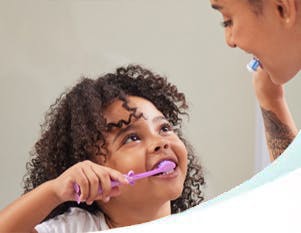Common Dental Problems Found in Children
As caregivers of children, it's up to you to help kids understand the link between oral health and overall health. By modeling behaviors like proper toothbrushing and scheduling regular check-ups with your child’s dentist, you’ll be off to a good start. It’s also important to be aware of some common dental problems that children may experience, so that you can get ahead of them before they become an issue.
Listen to what your children’s teeth are telling you, and they’ll reward you with a healthy smile.
Key Takeaways
- Kids’ cavities are prevalent and preventable. This chronic childhood disease can be prevented by properly caring for teeth.1,2
- Gum disease can begin in childhood. Early diagnosis and proper treatment can prevent it from progressing into a more serious form of periodontal disease.3
- Thumb sucking is normal but should be addressed by age 4. Positive reinforcement is recommended, rather than scolding.4
Kids’ Cavities and Tooth Decay
Tooth decay is the most common chronic childhood disease; one in five children has had tooth decay by the time they reach kindergarten.1 Tooth decay can negatively impact a child’s quality of life; cavities can make them more vulnerable to infections in other parts of the body, like the ears, sinuses and brain.1 If your child has a painful cavity, it may keep them from eating properly and getting the nutrition they need.
How Do Kids Get Cavities?
Bacteria in the mouth use sugar in the foods you and your children eat to create acid.1,2 This acid can wear away at the enamel, the hard outer layer of the tooth, causing decay and eventually, cavities.2
Everyone is at risk of getting a cavity, but caregivers should take notice if kids are:1,2
- Frequently snacking between meals
- Consuming lots of sugary drinks and foods
- Not brushing their teeth
- Not getting enough fluoride
- Have cracked or chipped teeth
- Have a personal history of tooth decay and cavities
Preventing Kids’ Cavities and Tooth Decay
Preventing cavities in children is all about good oral health:2
- Drink water
- Brush twice a day with a fluoride toothpaste
- Limit sweets and sugary drinks
- Don’t snack between meals
Keep your children’s teeth strong and healthy with Pronamel Kids Berry Twist toothpaste. It helps re-strengthen acid-softened tooth enamel surfaces following an acid challenge to help protect against the effects of future acid challenges. Pronamel Kids toothpastes are gentle on enamel^ and provide 24-hour cavity protection.*
To keep your child’s smile healthy, start using proper brushing techniques as early as possible, make sure they eat a good diet, and bring them in for regular dentist visits.
Gum Disease in Kids
Periodontal disease, also known as gum disease, can affect your children’s gums and the tissues that support their teeth and keep them in place.3
When bacteria is allowed to build up on teeth and isn’t brushed away, it forms a sticky substance called plaque.2 If plaque on your children’s teeth isn’t removed, it can harden into a substance called tartar, which can affect the gums in the form of gingivitis.3
Symptoms of Gingivitis in Kids
The mildest and most common form of gum disease is gingivitis.3 It causes the gums to be red, sore and swollen. Other common symptoms of gingivitis in kids include:3
- Bleeding gums during brushing or flossing
- Loose or separating teeth that show more spacing than normal
- Bad breath that won’t go away after brushing
Your child’s dentist can properly diagnose an instance of gum disease and will treat the issue according to its severity.3 Early treatment is the most important – this keeps gingivitis from progressing to a more severe form of gum disease that can affect how teeth are held in place.3 Proper oral health habits can go a long way to preventing gum disease in kids.3
The Truth About Thumb Sucking
Like many parents and caregivers, you may be concerned about your child’s attachment to their pacificer or how long they’ve been sucking their thumb. Sucking is a natural reflex for infants to help them feel secure and happy, and a thumb or pacifier may serve this purpose.4 However, prolonged thumb sucking can lead to issues with the alignment of teeth and the growth of the mouth.4
Breaking the Thumb Sucking Habit
While many children may stop using a pacifier or sucking their thumb on their own, those who haven’t stopped should be discouraged from doing so after they’re four years old.4 Putting pressure on your child is unlikely to work so caregivers can try these tips:4
- Praise a child for not sucking their thumb, rather than scolding them for doing so
- Focus on the cause of your child’s anxiety if you notice they self-soothe thumb sucking
Talk to your child’s dentist, a professional might be able to speak to your child with more authority on the subject! They might also recommend bandaging the thumb as a preventative.4
Many dental problems that affect children can be resolved with proper oral care, like brushing twice a day with a toothpaste designed to help keep your children’s teeth strong and healthy like Pronamel Kids.
^With twice daily brushing
*Follow a healthy diet and brush twice daily. (Level of protection may decrease between brushing)
Source Citations:
- Treating Tooth Decay. American Academy of Pediatric Dentists. https://www.aapd.org/globalassets/media/policy-center/treatingtoothdecay.pdf. Accessed 5/13/25.
- Cavities: What are They and How Do We Prevent Them? ADA. https://www.mouthhealthy.org/dental-care/how-do-we-prevent-cavities. Accessed 5/13/25.
- Periodontal Disease in Children. Stanford Medicine: Children’s Health. https://www.stanfordchildrens.org/en/topic/default?id=periodontal-disease-in-children-90-P01865. Accessed 5/13/25/
- Thumb sucking and pacifier use. Journal of the American Dental Association. https://jada.ada.org/article/S0002-8177(14)63176-7/fulltext. Accessed 5/13/25.





